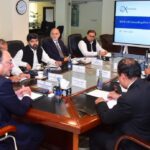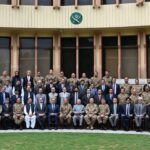By Qaisr-u-Zaman
ISLAMABAD, Jun 09 (APP): Though renovation and retrofitting of some 422 Federal Government schools and collages was undertaken to honour the APS martyrs students through Prime Minister’s Education Reform Programme but more resources are required to improve faculty members’ capabilities to make it a complete success story.
The investment being made on changing the physical outlook and provision of some concrete facilities is no doubt an appreciative move but it can only be helpful if faculty is capable to educate younger generations according to the requirements of the modern era.
Secretary Capital Administration and Development Division (CADD) Hassan Iqbal claimed that the standard of education in these upgraded institutions has increased and endorsed by the public, as five percent of the enrolled students have opted for the facilities from the public sector.
This shows the enhanced and reverted public trust, especially of the well off families who have admitted their children here, he added.
“Teachers’ training was vital to make them capable of imparting education in accordance with the modern era trends and requirements and we were keenly working on that to ensure complete success of the initiatives,” Hassan said.
The faculty staff’s attendance was also being ensured through mechanized technology and for the purpose FDE was also directed to install biometric attendance system at these facilities, he informed.
Hassan Iqbal said that under the Education Reforms Programme the school buildings were being whitewashed, broken walls were being rebuilt, CCTV cameras were being installed, blackboards were being replaced with white boards, and new synthetic chairs were also being provided.
Director General FDE, Shahnaz Riaz said the three-phase project has entered into the second phase and the government has released an amount of Rs three billion to CADD in which 200 more educational institutions were being renovated.
The amount, he said, would be spent on 200 new rooms and wash rooms, to be constructed in those institutions to cater students’ needs, Shahnaz said.
These institutions, Shahnaz said, were also being provided science and IT labs equipped with new apparatus, new buses were being purchased.
“We were also ensuring clean drinking water; sports facilities and class rooms were being decorated with academic material”.
The introduction of Montessori classes, he said, was also part of PM’s Educational Reforms programme for which initially five institutions were selected and it would later on be extended to the other ICT facilities.
Islamabad Model School for Boys F-8/3, F-7/1, F-10/4 and Sohan and Khanna Daak from rural capital were chosen to start Montessori course, Shahnaz said.
The educational experts were appreciative of the efforts of the government for at least giving some priority to the education sector but also warned that revamping of only physical structure may not serve the purpose.
An educationist, Associate professor Dr Inam Ullah Waqar said the major priority must be to enhance teachers’ skills and their financial well being to achieve the desired goal, otherwise the whole exercise is feared to go futile.
He said that the condition of the Islamabad Capital Territory (ICT) educational institutions was miserable in the past due to lack of rooms, labs, transportation facilities and teachers were not even paid their salaries in time.
Dr Inam also appreciated for taking into consideration the transport as students and teachers from far flung areas would be facilitated through this initiative.
The DG FDE Shanaz Riaz also unveiled the ministry of CADD ‘s plan to purchase about 70 more buses for the ICT institutions, besides appointments of the more teachers.
Saira Batool a female teacher at a rural area school said there were still many institutions in rural areas of capital seeking attention of the concerned quarters as students have to sit in the open ground and were reprieved of even minimum facilities to continue study.
Untrained and less qualified teachers, she said, were playing with the future of the students and this area was required to be given preference as compared to the beautification and renovation of concrete objects.
Muhammad Ali, the father of a student, said lack of modern IT and science labs in majority of the rural area schools was discriminatory approach and all the educational institutes must be provided standard facilities to ensure equality.






